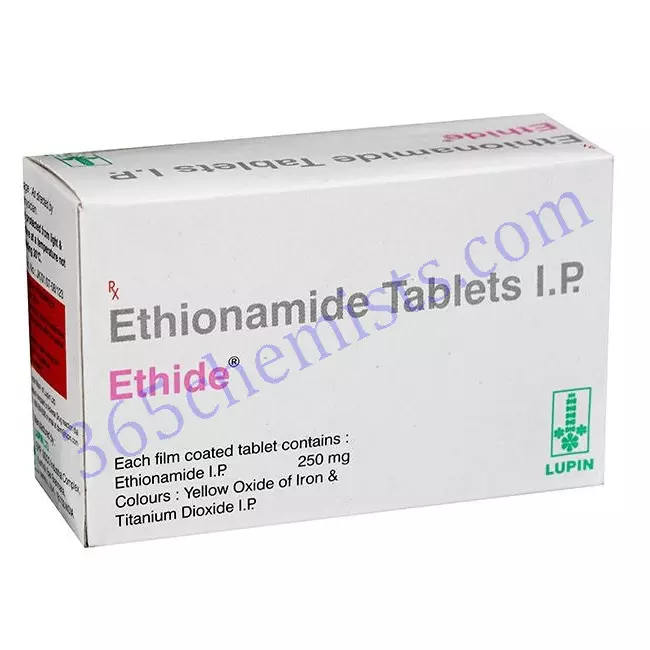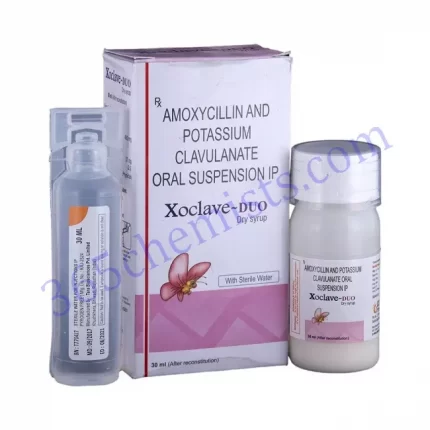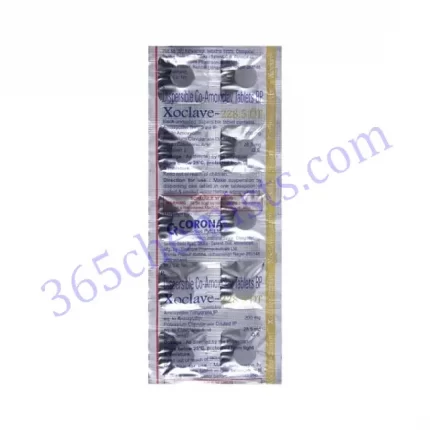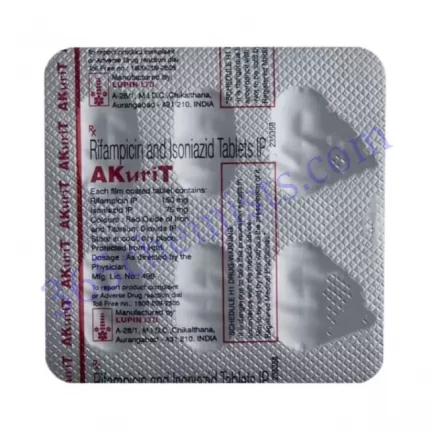Ethide 250mg Tablet (Ethionamide 250mg):
It is the ethionamide that serves as the active component in the pharmaceutical product known as Ethide 250mg Tablet. Its primary application is in the treatment of tuberculosis (TB), particularly drug-resistant strains of Mycobacterium tuberculosis, which are the causative agent of the disease. The drug class known as antitubercular agents, and more specifically thioamides, includes ethionamide as one of its constituents. This medication works by preventing the growth of the bacteria that cause tuberculosis, which assists in bringing the infection under control.
Uses of Ethide 250mg Tablet:
The primary indication for the use of the Ethide 250mg Tablet is in the treatment of tuberculosis. Drug-resistant tuberculosis infections are infections that are caused by strains of Mycobacterium tuberculosis that are resistant to first-line antitubercular drugs. This medication is specifically used for the management of drug-resistant TB infections. In order to maximise the benefits of the treatment plan, it is typically recommended to take this medication in conjunction with a number of other antitubercular drugs.
Dosage and Administration:
It is possible for the recommended dosage of Ethide 250mg Tablet to change depending not only on the severity of the TB infection but also on the patient’s age, weight, and general state of health. It is essential to ensure that the dosage and administration instructions provided by your healthcare provider are strictly adhered to at all times. To reduce the risk of experiencing adverse effects on the gastrointestinal tract, the tablet should be swallowed whole, preferably while eating. It is recommended that the Ethide 250mg Tablet be taken once daily, but you should follow your physician’s instructions regarding how often you should take it. The tablet should be swallowed whole with a full glass of water; it should not be crushed or chewed.
It is extremely important to finish the entire course of treatment with Ethide 250mg Tablet, even if your symptoms improve before the end of the prescribed duration of treatment. Skipping doses of medication or discontinuing treatment too soon can lead to a return of the tuberculosis infection or the development of resistance to the drugs being used to treat it.
Side Effects of Ethide 250mg Tablet:
The Ethide 250mg Tablet, like any other medication, has the potential to cause certain adverse effects in some people. Nausea, vomiting, stomach upset, loss of appetite, a metallic taste in the mouth, and diarrhoea are common adverse reactions that can occur when taking this medication. In most cases, these negative effects are mild, short-lived, and will go away once your body becomes accustomed to the medication. However, you should talk to your healthcare provider if any of these side effects continue or get worse after taking this medication.
In extremely rare instances, the use of Ethide 250mg Tablet may result in more serious adverse effects. These may include problems with the liver, such as jaundice (a yellowing of the skin or eyes), urine that is dark in colour, or persistent nausea and vomiting. It is also possible for it to cause side effects that are connected to the nerves, such as peripheral neuropathy, which can manifest in the extremities as tingling, numbness, or weakness. Seek immediate medical attention if you experience any of these serious adverse effects from the medication.
Precautions and Warnings:
Before beginning treatment with Ethide 250mg Tablet, it is important to discuss any preexisting medical conditions, allergies, or medications that you are already taking with your healthcare provider. Due to the fact that ethionamide can influence liver function, it is especially essential that any previous history of liver disease or alcohol abuse be disclosed.
There is a possibility that the Ethide 250mg Tablet will interact negatively with other medications, including those that are routinely employed in the treatment of tuberculosis (TB), such as isoniazid and cycloserine. For this reason, it is absolutely necessary to inform your doctor about all of the medications that you are currently taking in order to prevent the possibility of adverse drug reactions.
Women who are pregnant or breastfeeding should exercise extreme caution when using Ethide 250mg Tablet because the safety of this medication for use during pregnancy and lactation has not been thoroughly researched. Before prescribing this medication to you, your doctor will conduct an analysis comparing the possible benefits to the possible side effects.
Conclusion:
The antitubercular medication known as Ethide 250mg Tablet has ethionamide included in its formulation as its active ingredient. It is employed in the treatment of tuberculosis that is resistant to multiple drugs and is brought on by Mycobacterium tuberculosis. Your healthcare provider will give you instructions on the dosage and how to administer the Ethide 250mg Tablet. You should make sure to follow those instructions. Ethide 250mg Tablet may cause side effects, including disturbances to the gastrointestinal tract, despite the fact that it is generally well tolerated. It is essential to finish the entire prescribed course of treatment and seek professional help if any severe adverse effects appear during that time. Individuals who have liver disease or who are taking medications that might have an interaction with ethionamide need to exercise caution when taking the drug. Before using this medication, women who are pregnant or breastfeeding should talk to their doctor or other healthcare professional.












